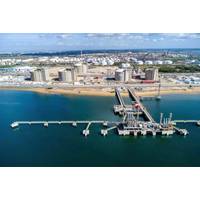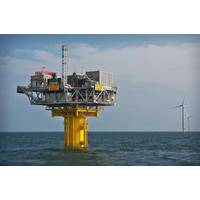French spot drops as expected wind and nuclear output increases

French spot electricity rates for Thursday dropped as the wind energy supply in France is expected to increase amid lower demand forecasts. One nuclear reactor will also be expected to re-start. By 0927 GMT, the French baseload for the day ahead fell by 15.6% and was 91?euros (106.02 dollars) per megawatt-hour (MWh). After closing Tuesday at 119.25 Euros/MWh, the German baseload day-ahead was not traded. Riccardo Paraviero, LSEG analyst, says that the outlook for Thursday is negative due to higher wind supply and lower consumption.
RWE and KKR announce long-term partnership for British offshore wind projects

RWE announced on Wednesday that it had agreed to sell a?stake in its Norfolk Vanguard West & East offshore wind project to investor KKR. The German utility was one of the winning bidders in a landmark British renewables auction. The deal is expected to close this summer. No financial details have been disclosed. However, RWE has stated that the two parties will assess the possibility of extending their collaboration on additional projects. RWE and KKR are collaborating to 'develop, build, and…
RWE Reports Near 15-Year High Boosted by Data Center Sale

RWE, Germany's largest power producer, reported higher-than-expected profit for the first nine months of the year, boosted by a 225 million euro ($262 million) book gain on the sale of a data centre project to a large unnamed cloud service provider.Shares in RWE, which is also the world's second-biggest developer of offshore wind projects, rose as much as 7% to their highest level since March 2011. They were last trading 6.7% up.The sale of the facility, located on the site of a former coal-fired power plant in Britain…
German Spot Falls on Stronger Wind Output
German spot electricity prices for Thursday dropped as the wind forecasts are lower, and the demand is expected to be lower. The French price increased on higher demand after Tuesday's holiday. German baseload for the day ahead fell 10.3%, to 70.40 Euros ($82.10) per megawatt-hour (MWh), by 0956 GMT. The French baseload for the day ahead was up by 38.9% to 31.25 Euro/MWh. LSEG data indicated that German wind power production was expected to increase by 4.1 gigawatts on Thursday to 30 GW. Meanwhile, French wind power is expected to decrease by 1.8 GW at 9.8 GW.
Eneos, a Japanese company, warns of rising costs in developing offshore wind businesses
Eneos Holdings - Japan's largest oil refiner that has expanded into renewable energy - warned on Wednesday of the rising cost of developing their offshore wind project. Their CEO said returns were difficult. Eneos' Japan Renewable Energy unit won the government auction in March 2024 to develop a 375 megawatt offshore wind farm in northern Akita Prefecture, Japan, with Spain's Iberdrola, and Tohoku Electric Power Co. Construction will begin in 2020, and operations are expected to begin in 2029.
France's offshore Wind sector is battered by government crises

Offshore wind developers, and suppliers of equipment are bracing themselves for a slowdown. A political crisis in France has caused changes to France's energy framework as well as government tenders to be stalled. Data released on Friday showed that business activity in France declined faster than anticipated in October. Emmanuel Macron's six successive prime ministers have been replaced by a divided legislature that has struggled to reach a budget-cutting agreement in the past two years. The PPE3, a bill that details the future energy requirements from 2026, has been long delayed.
Germany Sets New LNG Import Terminals into Operation

Germany is putting natural gas import terminals into operation as part of the country's efforts to replace piped Russian gas following Moscow's invasion of Ukraine in 2022.It is deploying floating storage regasification units (FSRUs) to receive seaborne LNG, which official data shows has captured an 11% share of all German gas imports over the first three quarters of 2025.Long-term, Germany is planning shore-based facilities to import and produce green hydrogen.Here are details of the latest developments:MUKRANThe terminal on Ruegen island in the Baltic Sea…
RWE withdraws $10 billion Namibia Green Hydrogen Project
RWE, the German energy utility, announced on Monday it was withdrawing from Namibia's $10 Billion Hyphen green ammonia Project. This is a blow for Namibia's ambitions of becoming a hydrogen hub. The pullback represents the latest example where companies are reconsidering their investments in a new technology that costs a lot to develop. RWE signed an initial non-binding Memorandum of Understanding with Hyphen in 2020 to take approximately 300,000 tonnes of ammonia per year - a compound that is mainly used to make fertilizer - starting 2027.
German LNG Terminals Seek to Replace Russian Gas Pipelines

Germany is putting into operation natural gas import terminals as part of efforts to replace piped Russian gas following Moscow's invasion of Ukraine in 2022.Its first move has been to deploy floating storage regasification units (FSRUs) to receive seaborne LNG, while long-term it is planning shore-based facilities to import and produce ammonia and green hydrogen.Here are details of the latest developments:MUKRANThe terminal on Ruegen island in the Baltic Sea, operated by private firm Deutsche ReGas, supplies onshore grids with LNG from pipeline firm Gascade's link OAL, via the Neptune vessel operated by Norway's
German gas storage is at 75%, but operators are keeping an eye on the winter supply

The German gas storage capacity has been filled to the minimum level required by the European Union for November 1 but INES, a national operator's group, says that it will continue to closely monitor supply security because there are still risks. INES stated on Tuesday that the requirement of 81% storage capacity by November 1 has been met. Data from the industry group GIE revealed that levels had already reached over 95% at this time last year. INES said that "this (75%) level offers a safe (winter season gas supply) if temperatures are warm or normal." It added that a cold winter could pose risks.
RWE, Apollo Set Up Joint Venture to Channel $3.7B Investment in German TSO

RWE has struck a long-term partnership with Apollo Global Management to secure funding for its 25.1% stake in Amprion, one of Germany’s four transmission system operators, as the country gears up for a decade of record grid investments.Under the agreement, Apollo will provide $3.74 billion (€3.2 billion) in equity to a newly formed joint venture with RWE. The vehicle will hold RWE’s 25.1% stake in Amprion and finance its share of the grid operator’s expansion program.Amprion runs the transmission network across seven federal states, serving around 29 million people in Germany’s industrial heartland.
Mitsubishi abandons offshore wind farms in Japan

A senior official in the industry ministry said that Japan wants to re-auction as many offshore wind sites as possible as soon as they can, subject to local community consent. The trading house Mitsubishi Corp announced on Wednesday that it would no longer build wind farms in the prefectures of Akita and Chiba due to rising costs. In 2021, the first state-wide auctions were held to award the rights to construct and operate these farms. The farms have a total planned capacity of 1,76 gigawatts and were scheduled to begin between 2028 and 3030.
Mitsubishi is considering abandoning offshore wind energy projects in Japan

Mitsubishi Corp announced on Wednesday that it is considering withdrawing from 3 Japanese offshore wind projects. Three wind farms are owned by Mitsubishi-led consortiums in Japan's Chiba Prefecture and Akita Prefecture. The trading house announced in February it was reevaluating how to proceed given the "significantly altered" business climate. Mitsubishi recorded a charge for the projects of 52.2 billion Japanese yen (354 millions dollars) earlier this year. Mitsubishi released a statement saying that they were currently evaluating all options, including the possibility of withdrawing from the project.
French spot prices drop on low holiday demand and a rebounding nuclear sector
The French spot price for electricity on Friday dropped on Thursday as the wind supply and French availability increased. Demand is expected to drop during Assumption Day, observed in France and Germany. French baseload day-ahead was down 49.2% to 46.75 Euros per Megawatt Hour (MWh) at 0804 GMT. The German equivalent contract, which closed at 111.25 euro on Wednesday, was not traded. LSEG data revealed that German wind power production was projected to increase by 4.9 gigawatts to 8.7 GW. French wind power is expected to rise by 2.3 GW up to 4.3 GW.
RWE's core profit for the first half of the year is hit by a weak wind trading
RWE, Germany's largest power producer, posted a lower-than expected core profit for the half-year period on Thursday. The company cited weak wind conditions and a tepid trading business. The company's analyst poll revealed that the average estimate for the first-half adjusted profit before interest, taxes, depreciation, and amortization was 2.24 billion euros. This is a drop of more than 25%. The group, the second largest developer of offshore wind in the world, has confirmed its outlooks for 2025 as well as mid-term guidance on earnings per share between 2027 and 2030.
AI revolution to transform Europe's outdated power plants
Microsoft and Amazon are looking to convert some of Europe's old coal and gas-fired power plants into data centres with ready access to electricity and water. Engie in France, RWE in Germany, and Enel in Italy are all looking to capitalize on the surge of AI-driven energy demands by converting their old power plants into data centres, and securing lucrative power supply agreements with their operators. The data center option is a great way for utilities to offset the high costs associated with shutting down old power plants and potentially fund future renewable development.
Shares in European Renewable Companies Rise After Revised US Senate Bill

Shares in European renewable energy companies rose on Wednesday after the U.S. Senate passed a revised budget bill the previous day which was more positive for wind power compared to an earlier version.U.S. President Donald Trump's "Big Beautiful Bill" makes it harder to develop wind and solar energy projects in the U.S. by effectively phasing out renewable energy tax credits after 2026 if projects have not started construction.In the Senate's final version, projects will be able to use the lucrative credits if they begin construction before 2026.
Shares of European renewable energy companies rise following revised US Senate bill
The shares of European renewable energy companies increased on Wednesday, after the U.S. Senate approved on Tuesday a revised version of its budget bill which was more favorable for wind power than an earlier version. The "Big Beautiful Bill", signed by Donald Trump, makes it more difficult to develop solar and wind energy projects in the U.S. The end date for wind and solar projects that start construction after this is 2027. The revised Senate bill excludes from the deadline all projects that begin construction in the next 12 month.
German utility RWE announces partnership with tech giant Amazon
The German utility RWE announced on Thursday a strategic framework deal with tech giant Amazon, in which the utility will deliver clean energy and receive cloud services in exchange. Cloud services include artificial intelligence and data analysis in exchange for electricity provided by RWE's solar and wind facilities. Some of these are already operational and others are in construction. RWE, a major utility company in Europe, has a portfolio of renewable energies in operation or in development that it can sell to Amazon and other hyperscalers in data centres to help them reach their green energy goals.
Siemens: Britain Needs Record Offshore Wind to Meet Targets

Britain’s next renewable energy auction must secure a record amount of new offshore wind capacity if the country is to meet its 2030 clean power targets, Darren Davidson, vice president of turbine maker Siemens Energy UK&I, told Reuters.The country has put offshore wind at the heart of its plans to decarbonise its electricity sector by 2030. It aims to boost capacity to 43-50 gigawatts (GW) by the end of the decade, from around 15 GW at present, although a government report in November said it would be a challenge to reach that goal.Britain holds annual auctions for renewable subsidies…